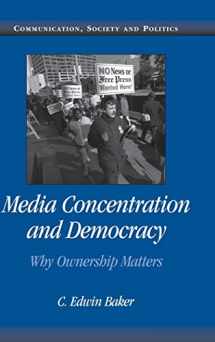
Media Concentration and Democracy: Why Ownership Matters (Communication, Society and Politics)
Book details
Summary
Description
Firmly rooting its argument in democratic and economic theory, the book argues that a more democratic distribution of communicative power within the public sphere and a structure that provides safeguards against abuse of media power provide two of three primary arguments for ownership dispersal. It also shows that dispersal is likely to result in more owners who will reasonably pursue socially valuable journalistic or creative objectives rather than a socially dysfunctional focus on the 'bottom line'. The middle chapters answer those agents, including the Federal Communication Commission, who favor 'deregulation' and who argue that existing or foreseeable ownership concentration is not a problem. The final chapter evaluates the constitutionality and desirability of various policy responses to concentration, including strict limits on media mergers.


We would LOVE it if you could help us and other readers by reviewing the book
Book review



